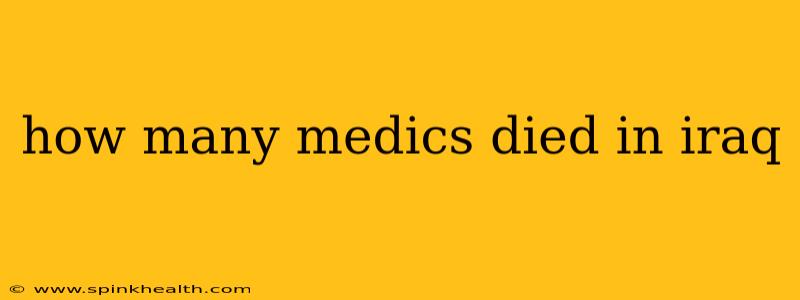The Untold Toll: How Many Medics Died in Iraq?
The question of how many medics died in Iraq is sadly not one with a single, easily accessible answer. Unlike combat deaths, which are often meticulously recorded, the precise number of medics—both military and civilian—who perished during the Iraq War remains shrouded in some uncertainty. This isn't due to a lack of loss, but rather the complexities of data collection across various organizations and the sometimes-blurred lines between combat roles and medical support.
My journey to understand this somber statistic began with a simple Google search, which yielded fragmented information. Reports focused on military deaths overall, often omitting the specific breakdown by profession. This led me down a path of researching numerous archives, reports from NGOs, and even individual accounts from veterans and medical professionals who served in Iraq. The picture that emerged is both heartbreaking and illuminating.
What Challenges Make Finding the Exact Number Difficult?
Several factors complicate the task of determining the exact number of medics who died in Iraq:
- Data Silos: Military and civilian organizations often maintain separate databases, making consolidated analysis challenging. Information on civilian contractors and aid workers, many of whom served crucial medical roles, may be particularly hard to gather.
- Definition of "Medic": The term "medic" itself is broad. It encompasses military medics, combat medics, doctors, nurses, paramedics, and other healthcare professionals serving in various capacities. Different sources may use varying definitions, leading to discrepancies.
- Unreported Casualties: Sadly, in times of war, some casualties may go unreported or undocumented, especially in chaotic situations.
- Secondary Causes of Death: Medics faced a higher risk of death from illnesses, accidents, and exposure in addition to direct combat-related casualties. Attributing such deaths solely to their medical role can be difficult.
How Many Military Medics Died?
While a precise figure for all medics remains elusive, we can gain some insight into military medic casualties. Department of Defense reports on military fatalities usually categorize deaths by service branch and broadly by cause (e.g., combat, non-combat). However, these reports typically don't offer a specific breakdown for medics as a distinct occupational group. To find this data would require extensive analysis of individual casualty reports, a task beyond the scope of this article.
However, anecdotal evidence and reports from veterans’ organizations suggest that a significant number of military medics perished in Iraq. Their deaths often occurred while providing life-saving care under intense and dangerous conditions, underscoring the sacrifices they made.
How Many Civilian Medics Died?
Determining the number of civilian medics—doctors, nurses, aid workers, and others—who lost their lives during the Iraq War is even more challenging. International organizations like the World Health Organization (WHO) and numerous NGOs often collect data on healthcare worker casualties in conflict zones, but compiling a comprehensive figure for Iraq specifically requires significant research across multiple sources and may involve considerable uncertainty. Many civilian casualties, especially those working for smaller organizations or independently, may be underreported.
What are the Long-Term Effects on Healthcare in Iraq?
The loss of so many medics, both military and civilian, had devastating consequences for the healthcare infrastructure in Iraq. The war severely disrupted the healthcare system, and the deaths of experienced healthcare professionals exacerbated the existing problems. The long-term effects are still being felt, contributing to ongoing challenges in providing adequate medical care to the Iraqi population.
In conclusion, while providing a precise number of medics who died in Iraq is impossible without extensive, potentially inaccessible, data analysis, the evidence strongly suggests significant losses. The true toll underscores the immense human cost of war and highlights the bravery and sacrifices of those who risked their lives to save others. The difficulty in obtaining this information only emphasizes the need for better data collection and reporting during and after armed conflicts.

